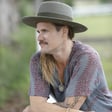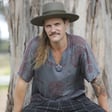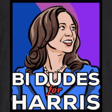Introduction and Schedule Changes
00:00:11
Speaker
Hello, everybody. Welcome to Two Bye, guys. I am Rob. Today is October 30th. You may be surprised to hear my voice today. Our last episode came out one week ago. And for the past couple of years, we've been on in every other week schedule. And I do want to give you time to listen to the last episode because it's awesome. But I am also going to take a little bit of a pause from interviewing by authors. It's book season.
00:00:38
Speaker
Book season will continue. I will continue. There's a few more authors I have to interview coming probably in early 2024. I'll put those out. But for now, I'm taking a pause to do a little bit of a mini-series within book season.
Book Promotion and Previous Episode Highlight
00:00:53
Speaker
about bisexual married men in anticipation of my book, as you all know, which is coming out exactly one month from today on November 30th. You can pre-order the book now. It is available on Rutledge's website on Amazon. In other places soon, you can wait to get it in your local bookstore. And I do want to say the episode that is up from last week with Elliot Schrafer, it's on his book Queer Ducks,
00:01:19
Speaker
Please listen. I'm cutting into your two-week window to listen to that, and I hope that that doesn't cause people to forget about that episode because it's so good. It's really special. I love it. I love that book. I love learning about the science of bisexuality, especially among animals. It's like something we don't often talk about, and it's something that for many, many years was not really studied.
Bisexuality in Animals: Common Misconceptions
00:01:45
Speaker
And as I talked about with Elliot in that episode, the more that scientists are looking for queer behavior in animals, the more they're finding it. When you look at animals with a binary lens, it causes a lot of misconceptions, which lead to missing things and seeing things a certain way. And often, like,
00:02:06
Speaker
not taking the time to gender the animals that are having sex and not even realizing that queer sex was happening. Or also looking at gay sex among animals, assuming those animals are gay, and then not following them and noticing that actually they're also procreating with the opposite sex in addition to experiencing pleasure with the same sex. And the more they're studying this, the more they're finding that they're actually very few strictly homosexual animals, but that
00:02:35
Speaker
almost all of the animals that we've observed having homosexual sex are actually bisexual and are having sex with all different genders or all different sexes in animals. We don't know their gender. It's not really a concept.
00:02:51
Speaker
But we talked about that too in the podcast. We talked about gender versus sex. And in a way, that episode really does give some good context for the Buy Married Men project I'm doing because it just shows you how normal and natural it is to be bisexual and to
00:03:10
Speaker
have the desire to be with Abbas's sex and procreate and also experience that same pleasure with the same sex. And our closest relatives, the Minobos, do it much more than we do. They're all having bi orgies all the time.
00:03:26
Speaker
And so, you know, why shouldn't we at least get to experience some of that? So check out that episode and then come back here for some bi married men.
Mini-Series Details and Video Content Announcement
00:03:38
Speaker
So what I'm going to do with this little mini series is over the next two months, I've been interviewing men who are already in the book. I'm going to hopefully be releasing these interviews once a week, a little bit of a faster pace than usual.
00:03:54
Speaker
and put out a handful of these in November and December before the book comes out and after. The majority of each interview will be here on the main feed. Just if you're subscribed already, you'll get them. But like the podcast this season, like the other episodes, there will be bonus content on Patreon for every episode.
00:04:15
Speaker
So if you haven't yet subscribed and you're interested in this topic, now's the time. There's going to be a lot of really interesting stories and perspectives from, you know, not necessarily by activists and artists and famous people or researchers like I normally interview, but like normal people who have jobs and lives outside of the by.
00:04:39
Speaker
space and yet are working to integrate their bisexuality into their marriages and their lives. And so I really think that there's a lot of different types of stories and different types of people, but you will find connections with them if you're in this kind of situation. And I'm really looking forward to sharing all these stories in the book and on the podcast. I'm also trying a new thing for this episode. For this particular one, I'm just going to talk to you for a little bit.
00:05:08
Speaker
There will be no bonus content for this episode, but I am trying a new thing, which is video. I'm gonna try to edit this video and put it up on the Patreon, and I'm gonna try to do the same thing for all the interviews with guys who are willing to be on video, which isn't everyone, but is most of them. And so if you're interested in seeing these guys during our interviews, as opposed to just hearing them, which I really think
00:05:34
Speaker
helps you get a full picture and helps you see people's mannerisms and what's going through their mind a little as they're speaking and is a valuable experience. Head over to Patreon and you'll be able to see the videos. So it's patreon.com slash Robert Brooks Cohen. There's a link in the show now. It's a link on social media.
00:05:55
Speaker
and enjoy. Okay, so here's what I'm gonna do today.
Conference Recap and Book Themes
00:06:01
Speaker
In September, I gave a little talk at the Bisexual Research Conference, which was all online on Zoom. I did about a 20-ish minute intro to the book, and I talked about some of the overall findings, and then I took some questions. I won't take questions today, but I'm gonna sort of give that talk, because it went well, and it gives a good overview of the book.
00:06:25
Speaker
and the reasons why I decided to do it. So if you've been listening to this podcast, you know this, but let me introduce myself for anyone who's new. I am a writer and creator living between New York City and Los Angeles, mostly LA these days, but back and forth a bit. I was a psychology major and film studies major in college, and then I went to school for dramatic writing at NYU where I got an MFA.
00:06:55
Speaker
So, I'm very interested in both of these spaces, the science of stuff and the psychology of queerness and bisexuality. Also interested in artistic representations of this kind of stuff, and that is what I'm working on in my writing career. I spent seven years working at Law & Order and writing for Law & Order, and a couple years on some other shows that you've probably never heard of.
00:07:19
Speaker
And then after Law & Order, I started this podcast. It's been about four years of producing two bye guys. There were two of us, as you probably know. Alex Boyd was here, and he helped me start this podcast, and it got off to a great start. He's moved on to other things, but I have continued and kept the name, even though there is just one bye guy today.
00:07:43
Speaker
I'm also on the leadership committee of by request, which is one of the bigger, probably biggest by group social groups in New York City. I'm also part of some by groups out in LA that I'm loving and really trying to build by community in
Interest in Bisexual Married Men Stories
00:07:59
Speaker
So, the book is called Bisexual Married Men, Stories of Relationships, Acceptance, and Authenticity. It comes out exactly one month from today on November 30, 2023, and it is focused on bisexual men who are married to women.
00:08:18
Speaker
specifically. And why is that? I want to explain why that's what I focused on, not because I think it's more important or more valid than any other experience, but I do think there was something missing in this space and this was something that was particularly not talked about
00:08:37
Speaker
And in a direct response to this podcast, it was something that there was a need for. And I noticed that this topic was really resonating with you guys as I was doing this podcast. So our most popular episode, the most downloads, is episode number one. And that is sort of obvious because I think when people discover this podcast, they often
00:09:00
Speaker
go back to the beginning, start there. Our second most popular episode is The Science of Bisexuality with Dr. Julia Shaw, which also makes sense to me. I mean, she's awesome. Her book was very popular. And I think people are really interested in the science of bisexuality. That was an appropriately
00:09:18
Speaker
titled episode. After those two, what I started to notice is that every episode we put out that deals with bisexual married men, and specifically by men who are married to women, it has double the downloads of other episodes around it. Those are the next most popular episodes besides the first two I mentioned. So clearly this topic was resonating. And then I also get a lot of DMs on our social media handles.
00:09:46
Speaker
you know, people discovering the podcast, people liking an episode. But the vast majority, I mean, it's probably like 80-90% of messages that I get these days are from bi-married men who are married to women.
00:10:02
Speaker
And many people tell me their story briefly, you know, how long they've been married, when they came out, when they discovered the podcast, telling me that the podcast has been helpful for them accepting this or understanding the dynamics in their marriage.
00:10:18
Speaker
Many of them are not yet out to their wives. Some are out to their wives, and that's it, and not out to anyone else. It's just an extremely, extremely common experience. And I still, I mean, every week I get messages. And so I realized that these men represent a huge portion of the audience of this show, and they're hungry for stories and resources.
Community Engagement and Listener Messages
00:10:42
Speaker
A lot of these people are asking me questions that they can't find the answers to elsewhere. These resources just don't exist and these stories are so hidden because sort of by definition, it's tough to put yourself out there when you're in this position. And so all these guys, many of you are probably listening to this right now,
00:11:03
Speaker
They want to hear from others in a similar situation, and they want to share their stories. And so many people think they're going through this alone, but it's actually very, very common. So in the middle of the pandemic in 2020, I had sort of paused the podcast, but I was talking to many of these guys. And I started to interview them, not knowing what the project was, just thinking it's some sort of oral history project. Didn't know it would be a book yet.
00:11:32
Speaker
In 2020, I conducted seven interviews of about 10 people that I had reached out to. And then later, after I turned this into a book proposal and knew that I had a book deal with Rutledge, I interviewed six more people. Interestingly, I put a call out, and that time, there were over 150 people that signed up for my database.
00:11:56
Speaker
So, I had to pick six out of 150 and I picked six that I thought were interesting or that filled sort of gaps in experiences from the seven I had already done so we could try to get a diversity of experiences.
00:12:11
Speaker
But this is not a strict scientific study. I did pick the people based on information they gave me so that I could tell some well-rounded stories and different types of experiences.
00:12:26
Speaker
So that means it's not strictly scientific. You should not draw major conclusions from the 13 interviews I did. Though I do have a psychology background, I am a writer and storyteller sort of first and foremost. So I approached this with a scientific mind, but these are oral histories. These are not necessarily scientific case studies.
00:12:51
Speaker
Now, why did I choose by men who are married to women? I chose this as a starting point, and I do hope to continue this project, both with the 150 guys in my database. You're still there. I have you. But I also hope to continue it in other forms and interview more people with different experiences, including by men who are married to men. That's not in this book at all, and it's a
00:13:18
Speaker
wonderful, valid experience that is also relatively hidden. I'd also love to explore bi-married women. I'd also love to interview more trans and non-binary folks or bi people married to trans or non-binary folks. There's a little bit of that in the book in that I am married to a trans woman and one of the guys I interviewed is a trans guy, another one identifies as non-binary.
00:13:43
Speaker
But for the most part, I did interview cis men who are married to cis women who I identify as bi. So I'd love to expand on that in the future if possible. The reason I started with bi men who are married to women is really just that I think that's where the biggest discrepancy is between the number of people in this category and the amount of resources about this experience. There are just so many people here and so few resources. So I really wanted to help
00:14:12
Speaker
bridge that gap. There are other gaps we need to bridge, but this was the biggest chasm, and so I'm starting there.
Statistics on Bisexual Men and Societal Challenges
00:14:21
Speaker
88% of bi people end up with a different gender partner. That's the current statistic. It's probably going to change in the future, and I talk in the book about why that is, and there are many reasons, but
00:14:39
Speaker
88%, I'll say it again, of bi people end up with a different gender partner. A little bit of that is because there are more Kinsey 1s and 2s than 3, 4, 5, 6s, and also
00:14:54
Speaker
many bi men are not out. And so exactly overlapping with that statistic, which is both an interesting coincidence and also not surprising, is that 88% of bi men are not out, which makes sense because if you're not out, you're probably not going to end up with the same gender partner. That would probably mean you would then be out in some way.
00:15:19
Speaker
And there's internalized homophobia, there's societal stigma and bi-negativity. So it totally makes sense to me that a majority of bi men are not out, but that's why we're doing this project. That's why I started this podcast. I do think that there are so many benefits to being out no matter what partnership you choose. And so I really want to share these stories to help normalize this stuff. And I'll talk more about coming out in a minute.
00:15:48
Speaker
Okay, so that's basically the intro. Why did I do this is just there are so, so many bi men married to women, majority who are not out, and there are barely any stories or resources about this. And where there are, there are often a lot of misconceptions. You know, this person is really gay and can't come to terms with it or things like, or like why, you know, speculation about why people are closeted or what goes on behind closed doors. And like,
00:16:15
Speaker
these stories I think will help dispel a lot of these myths and show you like what these relationships and marriages are really about and what happens inside of them and how hard it can be to work through some of these things and also the joy and pleasure and honest and good communication that can come out of confronting these things.
00:16:44
Speaker
So today I wanted to talk about five or six key takeaways I had from doing all these interviews. And like I said, this is not a scientific study. It's only 13 interviews. So we can't really generalize many things to full populations based on 13 interviews.
00:17:07
Speaker
But there were things I noticed that were very common among everyone. And even with a small sample size, that actually can be significant. And I'm also just going to talk about some anecdotal things I noticed, which I do think are representative of other people. I can't say exactly the percentage of how many people this applies to or how common things might
Masculinity and Personal Journeys
00:17:29
Speaker
But I will talk a little bit about things I just suspect that the people I interviewed are not the only ones who have been through that or feel that way. And of course, to actually hear about each of these stories, come back next week, subscribe to this feed, subscribe on Patreon. You will hear their stories from their mouths directly.
00:17:49
Speaker
you'll get at least an hour with each person, and then there's more in the book. So you'll really get to the nuances of some of the stuff I'm going to talk about now. So number one, one of the takeaways that I noticed is that many of the men I interviewed had non-conforming relationships with masculinity growing up.
00:18:12
Speaker
And also, many of them repressed that for years. So when I interviewed everyone for the book, I talked not just about their marriage, but about their childhood, their family, where they grew up, what it was like. And so many of them didn't feel like, quote, normal boys. Like many had more traditionally feminine interests. Many felt like they were outsiders or othered in some way.
00:18:38
Speaker
And for some, that helped connect them to their bisexuality or sexual fluidity at a younger age, but for others it did not. So it didn't necessarily determine an awareness of fluidity, but it was something that then, at this point, everyone was talked about or was able to connect back. And so, not that I think gender nonconformity leads to sexual fluidity,
00:19:07
Speaker
but it clearly is something that was associated or correlated for this group, which I found interesting and which I also personally identify with as I have talked about on the podcast many, many times. Another key takeaway, this is actually one of the things that has stuck with me the most and really was not what I expected, but
00:19:30
Speaker
is that coming out as by is not a binary singular event, especially for coming out to their wives.
Coming Out to Wives: A Gradual Process
00:19:41
Speaker
So going into this, I thought, I will separate out who was out to their wife before they got married and who was not out to their wife until
00:19:50
Speaker
after they got married. And I thought I'd try to get a good amount of each experience and separate them and we could compare, but it turned out to not be that simple. Most of the men I interviewed actually had to come out to their wives multiple times, often over many years, going a little bit deeper.
00:20:10
Speaker
each time. And that's often because many of us don't realize it until later in life, and many guys get married before that. So when they met their wives or got married, they didn't fully understand their sexuality or their fluidity. So some of them kept that hidden because they hadn't wrapped their heads around it.
00:20:33
Speaker
And some shared what they knew at the time, but they didn't know everything, so they couldn't possibly share everything, and they had to go deeper over time. The few people who were completely out before meeting their wives, they seemed to have
00:20:49
Speaker
positive outcomes and very good communication with their partners. But this was rare in the 13 interviews that people were totally already out and comfortable or already comfortable coming out right away when they met their wives. That was a minority of the interviews.
00:21:08
Speaker
But the thing that I saw lead to authentic and stable partnerships was embracing bisexuality. So for the people that were completely out before they met their wives,
00:21:23
Speaker
any of them had done a lot of work to embrace this in themselves, be comfortable with it, and that's why they were able to come out quickly. But even when that didn't happen, embracing it and acknowledging it and accepting it can happen within the marriage.
00:21:41
Speaker
And when that did happen for both partners, especially when it was embraced by their wives in addition to themselves, that really led to a lot of authenticity and good communication and outcomes that they saw as positive in their marriages.
00:21:57
Speaker
I'll get to that in a minute because I don't want to say that partnerships that last forever are the only successful ones or the only measure of success. Oh, actually, I will get to that
Positive Outcomes Post-Coming Out
00:22:10
Speaker
right now. So, number three on my list of takeaways
00:22:14
Speaker
is that coming out was a universally positive experience for all 13 men I interviewed, even when it led to a marriage ending, which I found interesting and which has sort of really affected me on like a deep emotional level. So
00:22:32
Speaker
For those couples that did stay together, coming out was sometimes difficult and caused conflict, but over time it led to a deepening of the relationship and more authenticity. So it's certainly something you have to talk about and work through, especially if you've been married for a while and have not yet talked about it.
00:22:53
Speaker
But there are many examples in this book of it was challenging at first, and we talked about it, talked about it one step at a time, led to a comfort with having difficult conversations and led to authenticity in the marriage and continuing the partnership.
00:23:14
Speaker
a few men that I interviewed did end up getting divorced. And even among them, none of them regretted coming out, which is complicated and beautiful. And I think that coming out helped them understand what they really needed and who they really were, and it helped them get in touch with their needs and being present and putting themselves out there in a relationship.
00:23:38
Speaker
and that helped them see if their current marriage was right for them and right for their partner and if it was really working for both of them. And sometimes it wasn't or sometimes people had changed since they met and that also didn't necessarily mean that
00:23:57
Speaker
their relationship was a failure or that it was bad or they regretted being together. In fact, there's a beautiful story coming up. His name is Austin. He was actually on the podcast in season two. He and his wife recently divorced and separated and yet there's so much love between them still and they're still friends and they're still co-parents and they actually run a business together.
00:24:20
Speaker
And what they talked about is that the container for their love has changed, and that they don't feel that what they both want from a marriage and living together is in sync with each other. And so they've sort of consciously decided to move apart, and yet they still have so much that they share, and there's so much love there. And they view their relationship as a success even though it has changed and shifted forms. And
00:24:50
Speaker
some people would look at it as it's ended, the marriage has ended, but they don't regret any of it. And I just think that's beautiful and you should read about that story and listen to that episode. I learned so much from that. Number four, this is just a quick one and I think it's really interesting and I've experienced it, but
00:25:11
Speaker
Among the people I interviewed, after coming out as bi, a lot of people were surprised by who came out to them and who revealed things to them once that door was sort of open. And I've talked about this, I've had that experience a lot. So many people in my life have told me thereby, only after I've told them that I'm bi, sometimes right away, sometimes a couple years later,
00:25:37
Speaker
But I really think that it's just hiding in plain sight. It's so much more common than we think. And once you put yourself out there, it's going to encourage that in return. And that's been a really nice, joyful thing for me, is to learn that, like, oh, some of my good friends are also mine. I never would have known had we not said something. And actually, in two cases in the book,
00:26:05
Speaker
parents of the men I interviewed came out as bi after they did, and some parents even came out as non-monogamous. And they had not come out to their own children until the child came out. And it's just like, I mean, there's a lot to unpack there, and
00:26:23
Speaker
Some of it we can't even unpack in the book because I'm not talking to those parents and we're not really sifting through it. But I do think that's just fascinating. I mean, to not to be to share something like this in common with a parent and not know it until your 30s or 40s. It's fascinating. It's a little fucked up. And it's I guess what's what it really is is unfortunate.
00:26:50
Speaker
Um, because, you know, those parents, it must be really hard for them too. I mean, it's so hard for us. It's so hard for the guys I interviewed. It must be even harder for people from older generations and even fewer examples and representation of how
00:27:08
Speaker
to talk about this or normalizing it and saying it's okay. So I can understand why those parents kept it hidden. I also think it's so beautiful that when the people I interviewed came out, they then learned this about their own families.
00:27:23
Speaker
Okay, number five is about non-monogamy.
Exploring Non-Monogamy
00:27:28
Speaker
So non-monogamy and bisexuality often conflated. There is some correlation, but actually when you look at the statistics, it's only a slight correlation. I have a whole chapter about this in the book on bisexuality and non-monogamy. So in other words, bisexuality does not equal non-monogamy.
00:27:49
Speaker
And yet, the thing that I noticed in these interviews was that non-monogamy became a topic of conversation for almost every man who came out to his wife. But not all of them needed to actually explore non-monogamy. So in other words, the conversation always came up
00:28:08
Speaker
But it wasn't like all those men who came out wanted to be non-monogamous or needed to explore. It just came up. So I think that it can come up from the guy's side where maybe he does want to explore. I mean, that did happen. And there are stories in the book where the guy wanted to explore and had to negotiate non-monogamy with their wives. And for some, they kept that going. For some, they tried it and they stopped.
00:28:34
Speaker
Or because of this societal biphobia and these stereotypes, women thought that that's what their husbands would want, or women were afraid that's what they would want, or they made an assumption. And so the conversation came up from their side. And often in that case, the guys were like, no, I don't want to be non-monogamous. We can remain monogamous. I just want you to know that I'm bisexual.
00:28:58
Speaker
So either way, whatever relationship style you choose, it's an important conversation to be prepared for within a marriage when coming out is by. Whatever the reasoning is, whichever side it's coming from, whether you want to explore non-monogamy or not,
00:29:19
Speaker
it is going to be a conversation for better or worse. And to be honest, I think it's for better. Even if you decide to be monogamous, I think having those conversations can only strengthen your partnership and help dispel assumptions and jealousies and really get to know each other better and really closely examine what about
00:29:42
Speaker
non-monogamy are you interested in or not interested in? Why does monogamy work for you? What do you really need in your partnership? So I guess I will editorialize and say I think the conversation is good no matter where you land or what you decide. The last takeaway I want to talk about are challenges for bi men. The biggest challenges for bi married men that I noticed
00:30:06
Speaker
Number one is understanding and navigating non-monogamy. When you have that conversation above, it's a whole other can of worms. Like there's bisexuality and a lot to talk about and work through there. There's also then a lot to understand non-monogamy and especially if you're going to go down that road and navigate it. There's a lot to learn and a lot of communication to do and a lot of negotiation
00:30:33
Speaker
ongoing negotiations. So totally a challenge that can be dealt with in great ways, but it is a new thing for a lot of people that can be challenging.
00:30:46
Speaker
Another thing that's challenging is being in a straight passing relationship, especially after you've come out and embraced your bisexuality and you've stayed together as a couple. That can be really tough. A lot of people, once they've done all that work, they don't like to be seen as a straight couple.
00:31:06
Speaker
and they want to find ways to be visibly bi. But that can be hard in a straight passing marriage. It can be hard without constantly asserting yourself and asserting your bisexuality. And sometimes doing that can leave partners feeling uneasy.
00:31:24
Speaker
It's like, why do you want to talk about this so much if we're in a monogamous marriage? And there are a lot of really good answers to that question and valid answers to that question. But that's something that has to be talked through and it can hold people back from being fully out in the world as by you want to be sensitive to your partner. So that can be a challenge.
The Need for Community Support
00:31:49
Speaker
And then the last thing that I think I saw was pretty challenging for people.
00:31:53
Speaker
is finding community, especially by community, but queer community in general, it's also extremely important. The couples that have found by community specifically love it and really think it adds value to their lives and
00:32:11
Speaker
helps normalize their situation and their identities, and it's so empowering. But outside of major cities, by community is mostly online. That's better than nothing. I mean, it's a great place to start. And if that's your only available access, it's great.
00:32:31
Speaker
But people are really craving in-person community. And I personally really saw the value of in-person community. It's a way to take this stuff from your brain into your body and into really feeling that this is totally normal and natural and great because you see other people thriving and really like done all this work. And when you see that in person, it's like real in a different way, at least it was for me.
00:33:00
Speaker
And so people are craving this in-person community and it can be hard to find, especially because, as I mentioned, 88% of bi men are not out. So if they're not seeking it, how are you going to find each other? And a lot of people just think they're alone, but they're not.
00:33:17
Speaker
hopefully this book will help normalize things and change that. And for those who have found community, they talk about it just really being life-changing, so important, so validating. Groups that people have found seem to be amazing and sort of the best case scenario, like
00:33:35
Speaker
you find a bi social group. Ambi is a great one. They have chapters all over the country, but again, only in big cities really. You can start a chapter of Ambi, go to their website, they'll help you get one started. But you know, if you're not in a city, it can be hard to get people to come.
00:33:54
Speaker
But outside of a group, even having one bi friend is so helpful and valuable for people. There were a couple people I interviewed who haven't found a group, but they've got one friend or two friends. And not gay men, but specifically bi, like having that other person who really shares a fluid sexuality or an understanding of fluidity is just so helpful and validating for people.
00:34:22
Speaker
So I hope that we can build more by community in lots of different ways after this book comes out.
00:34:38
Speaker
So overall thoughts for the future.
Envisioning a Stigma-Free Future
00:34:41
Speaker
I think that this book and this project is sort of like a time capsule of what these marriages are like now. I think so much is changing in this moment we're living in. So much has changed in the last five years, six years since I came out. And so much is going to keep changing. This is really like
00:35:04
Speaker
becoming a more visible topic, gender fluidity and sexual fluidity, and I'm so grateful for that. And I think as the next generation learns more about bisexuality and gender fluidity, these marriages will change and look different, and hopefully some of these challenges
00:35:21
Speaker
and obstacles will get a little easier and there won't be so much stigma and shame. The youngest guy interviewed for the book was 30 at the time of the interview, so pretty much everyone is in like the millennial or gen x generations and then there's one boomer, but everyone I interviewed
00:35:43
Speaker
kind of grew up before the year 2000 where bisexuality was much less visible and understood. I mean, in the last 10 years there's been a lot of progress, but I grew up not seeing bisexuality at all.
00:35:58
Speaker
It was just totally invisible to me. I thought it was gay or straight. It was very binary. And so a lot of the stories in the book, if not all of them, are people who grew up with a similar mindset and had to change that, adjust it, work on that, and come up with a new conception of sexuality and gender that fit what they were feeling. And so that work was really hard, and you'll hear about those stories and the challenges of that.
00:36:26
Speaker
And I hope that that's changing, but as much as it is changing, we still have a long way to go, in my opinion. We still need way more resources, way more visibility of this experience. We especially need more by community just to normalize this. By people are the majority of the LGBT community. We're 57% of the LGBT community, and yet this is still such a hidden experience.
00:36:56
Speaker
I hope that this is like part of a building snowball and we get more and more and more until this sort of is seen as like not an aberration or a confusing thing but as the norm. And my final thought is just that like I focused on this group for now and obviously there's so much work to do in all areas of queerness and bisexuality and gender.
Bridging Worlds and Embracing Identity
00:37:22
Speaker
But I do see this group of men by men married to women in a unique and special position. I see them as a bridge in some ways because many of them have lived, grew up, and have lived a lot of their lives
00:37:39
Speaker
in straight culture and identifying as straight and coming out later in life. And then now we're part of this queer culture and we're increasingly accepted and increasingly visible. And I just see this group as a beautiful bridge between these worlds. And what I hope to do is invite all bi-married men, especially those
00:38:04
Speaker
who are not yet out or who don't think their bisexuality is very important in their lives. I hope to invite them into queerness in ways that feel safe for them, in ways that work for their marriage and their lives. But I think it's so important to invite this group in, in any way they feel comfortable, because we can use our unique position as bridge builders.
00:38:30
Speaker
I think we can help normalize this stuff to the cis-het straight crowd who may be wary and not see this as something that is close to them. I think bi-married men are in sort of a wonderful, unique position to show that spectrum and what it is and that
00:38:54
Speaker
very often we're looking at the ends of the spectrum and these men are somewhere in the middle and like it's so hidden and that's what we really need to bridge this gap is people living in the middle of this spectrum and thriving in it and being their authentic selves within that and figuring out their place on that spectrum. And so I really am so grateful to
00:39:22
Speaker
all 13 guys I interviewed and their wives. And I'm also so grateful to the 150 men who signed up to participate who I couldn't get to and hope to get to. But everyone who is acknowledging this for themselves and learning to embrace it for themselves
00:39:40
Speaker
and willing to share that with others. It's such important work. It's such important visibility. I'm so glad that there's more and more of us out there, and I hope that hearing these stories in the book and here on the feed will encourage more people to find that connection with others, to find
00:40:03
Speaker
that community and to be more out in whatever way they choose and be more visible. I know it's hard. I would never tell an individual person to come out because I don't know your circumstances and it can be unsafe. There are many, many factors to consider, but I would go back
00:40:23
Speaker
to the takeaway that I learned from doing these interviews, which was that coming out was a universally positive experience. Even when there were things you were scared of and maybe it led to things happening that you didn't want or didn't anticipate, overall the process just
00:40:41
Speaker
really, for me, it gave me access to my true feelings and my true self, helped me be more authentic and not afraid to censor myself, and not transferred to other areas of my life. It helped me really live in the moment and become more comfortable with whatever happens in my life and wherever it leads, and to find
00:41:05
Speaker
joy and authenticity now and the moment because you can. You can always do that. We don't have to be always working for a specific goal and waiting for happiness until we get there. We can embrace and love ourselves as we are now. And to me, that's the best path forward, especially in the face of
00:41:31
Speaker
things that seem scary and things that seem impossible. It's not, you can do it. And hopefully these stories will help give you some frame of reference and some people to connect with and stories to connect with. So thank you for listening to this episode. That is basically all I've got for you today. Hopefully that gives you an overview of what
00:41:54
Speaker
the book will be about. You can find the link to purchase the book in the show notes here on to Buy Guys social media. I am almost done with my website. You can buy it from my website soon. I will announce that as soon as it's done, hopefully next week. Stay tuned for some interviews with Buy Married Men. And if you want to hear the full interviews, and if you want to see these guys on video, not just audio, head to patreon.com slash Robert Brooks Cohen.
00:42:24
Speaker
sign up for the Patreon. I really appreciate everyone who has signed up so far. It helps me keep this going. I would take questions like I did at the Buy Research Conference, but this is a podcast, so I can't take questions. What else? Anything else? I think that's it. Check out Queer Ducks with Elliot Traiford, check out the last episode, and stay tuned for more right here about bisexual married men.




















